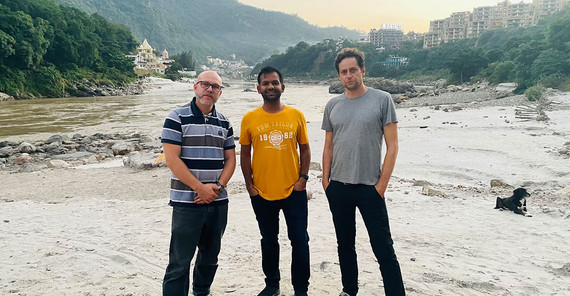Co-PREPARE – What is it about?
Dr. Jürgen Mey: The project deals with natural hazards in the Himalayas. The challenges of global change come together in this region. On the one hand, receding glaciers and permafrost are affecting the availability of water during the dry season in the medium term. On the other hand, the warming of the atmosphere is leading to more frequent weather extremes such as flash floods and landslides. This collides with rapid economic development and the concomitant expansion of transportation and energy infrastructure.
Prof. Ankit Agarwal: The Co-PREPARE project, focuses on natural hazards in the Himalayan Region. This endeavor aims to enhance joint hazard research capacity by pooling expertise, methods, and data to comprehend impacts and changes in the Himalayas and beyond. This cooperative effort involves research, scientific work, and training commitments.
What is the aim of the cooperation?
Mey: We are pursuing three goals: firstly, to strengthen the internationalization of both institutions through exchanges of students, researchers, and staff of the international relations departments; secondly, to jointly investigate extreme hydrometeorological events and their impact on the population; and thirdly, to transfer knowledge between the partners and to the public.
Agarwal: The project aims at strengthening institutional internationalization, fostering collaborative research, and generating actionable knowledge. Co-PREPARE promotes internationalization through staff exchanges and administrative initiatives. Emphasizing sustainable cooperation, it seeks to amalgamate expertise and resources, focusing on scientific work and training to deepen the understanding of the region's hazards.
How does the cooperation in the project work in concrete terms – especially in view of the great distance?
Mey: The collaboration essentially works through constant exchange via emails, phone calls, and video conferences. Since the time difference is only four and a half and three and a half hours, respectively, our working hours overlap sufficiently.
Agarwal: Despite vast distances, Co-PREPARE's cooperation transcends boundaries, extending into institutional and diplomatic realms. Amid COVID-19 challenges, our accomplishments exceeded projections due to consistent meetings, information exchanges, and unwavering administrative support.
Where and how does the research come into practice?
Mey: In addition to the publication of the scientific results, which can become the basis for political decisions, it is an important task to raise awareness among the local population. Therefore, teams from the Indian Institute of Technology conduct workshops in particularly exposed communities. In addition, we offer an online lecture series that is available to the public via the project website.
Agarwal: We contribute studies that highlight the risks associated with hydropower expansion and tourism-related development, which is crucial for policy planning and disaster mitigation. Furthermore, we integrate local knowledge by following a participatory approach that not just contributes to disaster-resilient planning and sustainable development but also ensures the acceptance of stakeholders.
The Project
Co-PREPARE - Indo-German Joint Project on Natural Risk Assessment and Forecasting in the Himalayan Region
Funding: DAAD (Deutscher Akademischer Austauschdienst) / UGC (University Grants Commission - India)
Duration: 07/2020-06/2024
Involved: University of Potsdam; Cooperation partners: Indian Institute of Technology, Roorkee (Indien); Potsdam Institut für Klimafolgenforschung; Deutsches Geo-ForschungsZentrum GFZ; National Institute of Hydrology (Indien); Central Building Research Institute (Indien); Wadia Institute for Himalayan Geology (Indien)
This text was published in the university magazine Portal Wissen - Eins 2024 „Bildung:digital“ (PDF).

